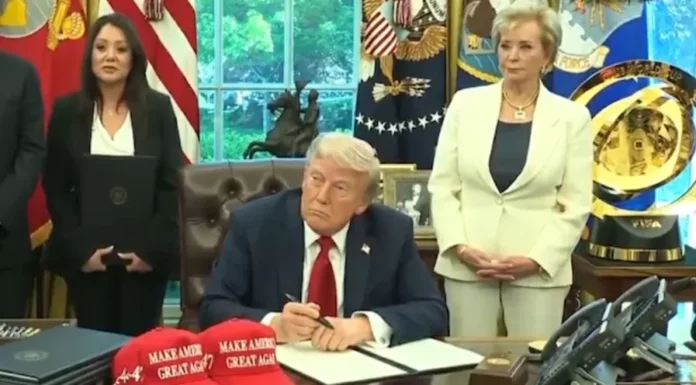In a recent executive order, President Trump has revoked the Obama-era discipline guidelines that were put in place to address racial disparities in school discipline. This move has sparked debate and raised concerns about the future of diversity, equity, and inclusion (DEI) practices in schools.
The Obama-era guidelines, which were implemented in 2014, aimed to address the disproportionate discipline of students of color in schools. It required schools to collect and report data on disciplinary actions, such as suspensions and expulsions, in order to identify and address any racial disparities. The guidelines also encouraged schools to use alternative disciplinary measures, such as counseling and restorative justice, rather than relying on punitive measures.
However, President Trump’s executive order has now revoked these guidelines, claiming that they were “overly prescriptive” and “undermine the safety and rights of students.” This move has been met with criticism, with many arguing that it will only worsen the already existing racial disparities in school discipline.
The revocation of these guidelines is a significant shift in educational policy and has raised concerns about the future of DEI practices in schools. DEI has become a crucial aspect of education, as it aims to create inclusive and equitable learning environments for all students. It recognizes the importance of diversity and works towards eliminating any biases or discrimination in schools.
With the revocation of the Obama-era guidelines, there is a fear that schools may revert to discriminatory disciplinary practices, particularly towards students of color. This could lead to a perpetuation of the school-to-prison pipeline, where students of color are disproportionately punished and pushed out of the education system.
Furthermore, the revocation of these guidelines sends a message that the current administration does not prioritize addressing racial disparities in education. This could have a negative impact on the morale and well-being of students of color, who may already feel marginalized and discriminated against in the education system.
In addition, this move also raises questions about the future of DEI practices in schools. Will schools continue to prioritize diversity, equity, and inclusion, or will they be pushed to the side in favor of a more punitive approach to discipline? It is crucial for schools to continue to prioritize DEI practices and work towards creating inclusive and equitable learning environments for all students.
It is also essential to note that the revocation of these guidelines does not mean that schools are no longer responsible for addressing racial disparities in discipline. Schools still have a duty to ensure that all students are treated fairly and equitably, regardless of their race or ethnicity. It is up to schools to proactively address any disparities and work towards creating a safe and inclusive learning environment for all students.
Moreover, the revocation of the Obama-era guidelines does not mean that schools should completely abandon alternative disciplinary measures. These measures have been proven to be effective in reducing suspensions and expulsions and promoting positive behavior in students. Schools should continue to explore and implement these measures, rather than relying solely on punitive measures.
In conclusion, the revocation of the Obama-era discipline guidelines by President Trump is a significant shift in educational policy. It has raised concerns about the future of DEI practices in schools and the potential impact on students of color. However, it is crucial for schools to continue prioritizing diversity, equity, and inclusion and working towards creating inclusive and equitable learning environments for all students. It is also essential for schools to proactively address any racial disparities in discipline and explore alternative disciplinary measures. As we move forward, it is vital that we do not lose sight of the importance of DEI in education and continue to work towards creating a more inclusive and equitable education system for all students.

